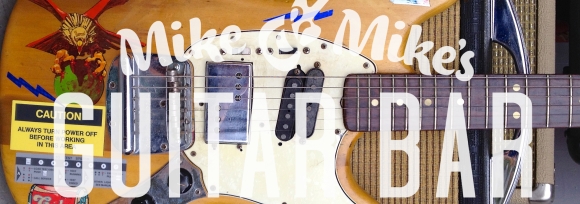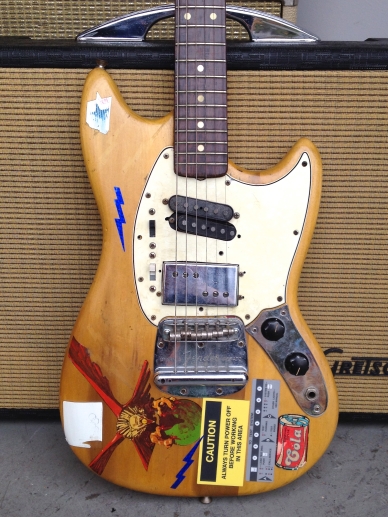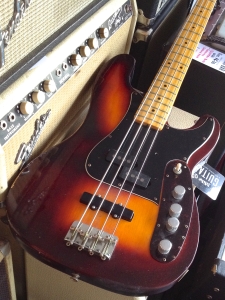…that is the question
Whether ‘tis nobler in the mind to suffer
The slings and arrows of outrageous guitar tone
Or to take arms against percieved troubles
And by opposing end them.
In the opening phrase of Act III of Shakespeare’s Hamlet, the titular character weighs in on death and suicide, the unfairness of life, and whether one is any better than the other. Likely the most quoted phrase in existence, The Bard’s universally famous question has been repeated, adapted, chopped up, parodied, and revered in innumerable ways since the great tragedy was written in or around the year 1600.
And so, in a flash of utter predictability, I’ve tweaked those first six lines to fit today’s musings, and to be honest, I think it works. The despondent prince was, in essence, comparing life and death, wondering if one had merit over the other. And when we’re modding guitars, it sometimes feels so dire, does it not?
The Heart-ache, and the thousand Natural shocks That Flesh is heir to
When customers write, call, or visit me to ask what I think of their proposed modifications, it’s an exciting prospect no matter what we end up deciding. Instruments are an intensely personal thing for musicians, so the idea that we can easily take a guitar you like and turn it into one you’ll love is why this world is so fun. Like all things, mods have their place, and can be just the thing to rejuvenate your creativity.
True, guitarists are fickle, and what works on Tuesday may be the complete wrong thing come Friday. You may have a friend that tried out a new pickup over the weekend, and blazed through the honeymoon phase and went straight on into divorce. Or take my friend, who bought that expensive boutique speaker for his Princeton and later told me, “I tried to convince myself that I liked that thing.”
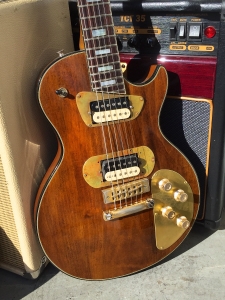
I actually really like the mods done to this ’70s Les Paul Recording. Many players hated the low-impedance pickups, and those brass plates look particularly good, says I.
Another good friend toured with a big-time act as tech and tells the story of a night when the guitarist decided that his fuzz pedal didn’t sound right, so he asked for the spare to be put in its place. He played it for sound check, decided he didn’t like it, and had the tech replace it with the third spare, only there was never a third, so the tech put the original back in line. Immediately the response was, “Oh yeah, YEAH, that’s the one!”
And that’s how we are, including myself. From my extensive and incredibly scientific studies, I know that it takes me exactly 0.00359 seconds after performing a mod to start researching other options, even if I love what I’ve come up with. Is this due to the quest for tone we often talk about, or perhaps an inner dissatisfaction that lurks within my being? Perhaps it boils down to musicians being such staunch individualists. No matter the cause, it’s not so surprising that we’re looking for the next new thing as soon as the old new thing is, well, old.
So, when it comes to mods, whether the concept is a passing phase or a long-held belief, it’s good to have a measure of sobriety when considering chopping up your main squeeze. Here are a few things I like to consider before modding:
To sleep, perchance to Dream; aye, there’s the rub
So you have a killer idea to finally achieve that sound in your head. Great! Sleep on it, do some research, seek out demos or schematics, should they apply. Consult a friend, a tech, or the internet. Gather as much information as you possibly can so you’re making an informed decision.
Like all projects worth undertaking, it’s a good idea to slum around forums and the like to get a feel for the kind of work you’re in for. Has someone done this mod before? With billions of people on planet Earth, chances are, yes, someone has. And though it may fly in the face of individuality, checking up on the errant post to glean insight into your desired modification is encouraged if for no other reason than learning what NOT to do!
There have been a few times when I’ve taken on a project that I’ve never done before where checking out one of my favorite forums lead me to a thread simply entitled “HELP!” that gave me all of the information I needed to ensure a fool-proof installation. From wiring a four-conductor humbucker to routing a new cavity for that fancy tremolo you bought at the guitar show, there’s a lot to learn from folks that learned the hard way.
Thus Conscience does make Cowards of us all
Just like your favorite poncho, it’s good to ask, “Is this reversible?” While it’s not a make-or-break kind of question in most cases, this is a great thing to mull over before you pick up your screwdriver or Dremel. There’s no sense in utterly ruining your favorite guitar just because you wanted something different, especially with the glut of aftermarket parts out there these days.
In most cases, things like pickups are totally reversible and really only mean resoldering some connections. No big deal. Swapping necks, similar parts, bridges, all of that is totally fine and you should do it. There are a few cases where I’d caution against such things, and usually that’s when we get into the pristine vintage guitar realm.
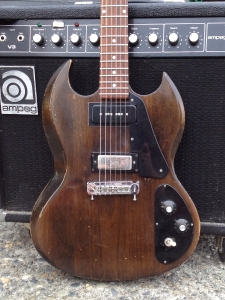
Or take this old Gibson SG-1 that I modified for a neck pickup for a customer. Neither desirable nor rare, these guitars are ripe for mods.
If you’re modding, say, a Squier Vintage Modified Jazzmaster, go for it! There are so many of those guitars out there that routing for Wide Range pickups or adding one behind the bridge isn’t going to matter or affect the value in any appreciable way. For a $200 guitar, they’re perfect for this application, and I can tell you that they’re solid testbeds, having worked on more than a few. I also have very little problem doing the above to Fender AVRI guitars, again, because they’re plentiful. Unless you’re thinking of selling your black ’62 Jaguar reissue, don’t feel too bad about omitting the rhythm circuit or slamming some lipstick pickups in there.
If, however, you have a 100% original 1958 Jazzmaster but you really think it needs humbuckers and a Floyd Rose, I’ll probably champion the cause of the unspoiled instrument in front of me rather than simply agreeing and getting out my router.
I’m reminded of a customer we had last year that owned an absolutely mint ’65 Fender Mustang in Sonic Blue. I mean, this was an absolutely untouched, beautiful instrument in every respect. The customer, however, didn’t like blue, and asked if I would refinish it in red. That was one of the few jobs I flat-out declined, and instead suggested we should sell the instrument and acquire either a red one in like condition (for about the same price, too) or buy a guitar that had been mucked with, and refinish that one to the desired color. Eventually, we did the latter, and as far as I know, he ended up being really happy with the new guitar.
In my view, there’s no reason to carve up an immaculate instrument when there are literally thousands of already modded and refinished vintage guitars out there. Sure, things like sound, feel, and playability come into play here, but those things can usually be addressed rather easily. When it comes to devaluing an aged instrument, I try to think a few decades ahead and wonder what I’d think of myself for doing so. That solves more than a few problems.
Of course, if your old friend has been refinished, routed for humbuckers, missing its original guard and decal… then it’s either a good candidate for restoration, or you should do all of those mods you’ve been thinking of! Me, I’m always on the lookout for a cheap, routed-out, refinished ’63 Jaguar that I can do my own thing with.
Also worth mentioning: sometimes you don’t have to do anything drastic to your guitar, what with pickup makers like Curtis Novak putting Mosrite pickups, PAFs, Wide Range humbuckers and Gold Foils in more familiar bobbins.
The insolence of Office
When I hear someone say, “It works for ____ so it’s good enough for me,” I tend to worry just a little bit. Not because the proposed mod is a bad idea, but that statement has a lot more going on than the speaker may realize.
Big-name guitarists can get what they want, generally speaking. When you have connections at your favorite guitar company, a dedicated tech or two, and the money to back up your whims, a lot of mods inevitably start to happen. Sure, there’s nothing wrong with swapping pickups in favor of something that suits your needs, but I’ve seen enough modified instruments to know that not every idea is a good one.
One of the things that often separates the average musician and the touring pro is that they have an army of techs at their disposal, paid well (I hope) to swap those pickups, change out bridges, and glue splintered wood back together on the quick so the show can go on. Some things work, and some things don’t, while others require a lot of attention to keep in check.
I know of one such touring pro that had his tech quickly install a brass nut on his instrument, searching for that brighter sound he craved. When I worked on the guitar some time later, I discovered that the nut slots weren’t cut properly, so the strings were binding up, causing tuning problems. Obviously, this wasn’t ideal. The thing is, the player never noticed it, because he never played solos or bent strings, only big chords. He didn’t know about the problem his guitar had because he had a tech to tune it between songs!
The Undiscovered [Flavor] Country
That kind of sounds like a Shakespearean cigarette ad, doesn’t it?
Though this article may sound cautious, please don’t take it as a strict warning against figuring out that sound in your head. At most, I’m just offering a few thoughts to help the potential guitar modder some guidance. What matters most is that you’re happy with the instrument you’re using, and if a cool mod gets you there, then it’s a good one. Some mods might be more effective and less intrusive than others, but there is merit in tweaking a design to work for you.
The old adage “You won’t know until you try” certainly applies. So I say, go for it! But maybe have a good think about it first.

